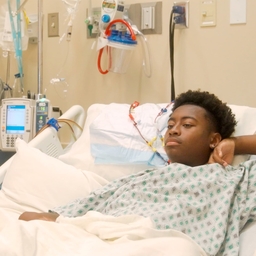Join CHOP Souderton for a Free Virtual Event on Anxiety in Children and Teens
CHOP Primary Care, Souderton partners with local organizations to present a free virtual talk for parents and caregivers on anxiety in children and teens.
At CHOP's Pediatric Headache Program, you have access to a dedicated team of experts who work in close collaboration to help improve your child’s headaches and quality of life.
CHOP Primary Care, Souderton partners with local organizations to present a free virtual talk for parents and caregivers on anxiety in children and teens.
Parents and caregivers are invited to attend our community events this October presented by CHOP Primary Care, Doylestown, in partnership with local organizations.
We are proud to announce that Fred Henretig, M.D., a pediatric emergency medicine physician and toxicology expert received the 2024 American Academy of Pediatrics Section on Emergency Medicine’s Steve Miller Award for Excellence in Education and Mentorship at the American Association of Pediatrics (AAP) annual meeting.
A new study from researchers at Children’s Hospital of Philadelphia (CHOP) found racial and ethnic disparities in pre- and early adolescent exposure to extreme heat, as well as a small but significant association between extreme heat and specific behavioral symptoms like aggression. The study was recently published in the journal JAACAP Open, the open-access journal of the American Academy of Child and Adolescent Psychiatry.
Researchers in the Orthopedic Center at Children’s Hospital of Philadelphia (CHOP) found that white youth from wealthier socioeconomic areas were more likely to be prescribed opioids in the emergency room for supracondylar humerus (SCH) fractures, a broken elbow, compared with their same-age, non-white, peers from disadvantaged regions. The authors will present their abstract at the 2024 American Academy of Pediatrics (AAP) National Conference & Exhibition in Orlando, Florida.

Sep 27, 2024
Babies with colic can cry for hours. A CHOP pediatrician offers suggestions for soothing a baby with colic, and for keeping yourself calm.
Hundreds of variants in “secondary finding” genes could guide treatment for patients to avoid risks and complications of health issues in adulthood.
Sep 26, 2024
Researchers at Children’s Hospital of Philadelphia (CHOP) revealed for the first time that children, adolescents and young adults may experience very rare neurological issues of paraparesis and quadriparesis following chimeric antigen receptor T-cell (CAR-T) therapy, a type of immunotherapy used to treat B-cell Acute Lymphoblastic Leukemia (B-ALL). Additionally, these complications occurred without the type of inflammation typically seen in adults. The findings were published today in the journal Blood.

Sep 25, 2024
CHOP announced that its first patients outside of clinical trials have begun the treatment process for the newly FDA approved sickle cell gene therapies.
Dr. Scott Lorch of Children’s Hospital of Philadelphia (CHOP) invited to serve as a member of the Health Resources and Services Administration’s Advisory Committee on Infant and Maternal Mortality.